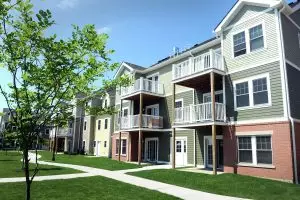In the past decade, the rising cost of housing in Massachusetts has emerged as a significant challenge, particularly in its more populous cities. This escalating trend has serious implications for homeowners, potential homebuyers, and overall economic health in the region.
The heart of the issue is straightforward: the cost of housing is outpacing wage growth. Despite Massachusetts boasting one of the highest median incomes in the United States, many residents are finding it increasingly difficult to afford homes in their communities. As housing prices soar, homeownership is becoming an elusive dream for many, especially for first-time buyers and those in lower income brackets.
Implications for Current Homeowners
For existing homeowners, the affordable housing crisis is a double-edged sword. On one hand, they can rejoice as their properties’ value increases. On the other, the associated costs—property taxes, insurance, maintenance—are rising in tandem, creating financial strain. Plus, those hoping to upgrade to a larger home may find the price gap too wide to bridge.

The shortage of affordable housing also affects the fabric of communities. As prices rise, some homeowners may find themselves living in neighborhoods increasingly devoid of the diversity that contributes to vibrant, healthy communities. In some cases, adult children of homeowners may not afford to live in the communities they grew up in.
Implications for Prospective Homeowners
For prospective homeowners, the primary hurdle is the initial price of entry. The climbing costs of properties put homeownership out of reach for many, especially in high-demand areas like Boston and its suburbs. Additionally, the inventory of starter homes is low, causing demand (and prices) to rise even more.
These high costs often lead to increased debt-to-income ratios, with potential homeowners having to commit a higher percentage of their income towards a mortgage. As a result, economic resilience may be compromised as these homeowners have less financial flexibility.
The Path Forward
Addressing the affordable housing crisis in Massachusetts necessitates concerted efforts from all stakeholders. Policymakers, real estate developers, and community leaders need to collaborate to create strategies that increase the availability of affordable housing.
This could include revising zoning laws to encourage the development of multi-family dwellings, offering incentives to developers to build more affordable units, and introducing policies that can help curb the excessive growth in property prices.
In the meantime, homeowners and prospective homeowners should stay informed about the local housing market and available support programs, such as the ONE Mortgage Program, which provides lower-income households more affordable mortgage options.
The affordable housing crisis in Massachusetts is a complex issue with wide-ranging effects on individuals and communities. It’s a challenge that requires urgent and coordinated action to ensure that homeownership remains within reach for all residents, and communities continue to thrive.
